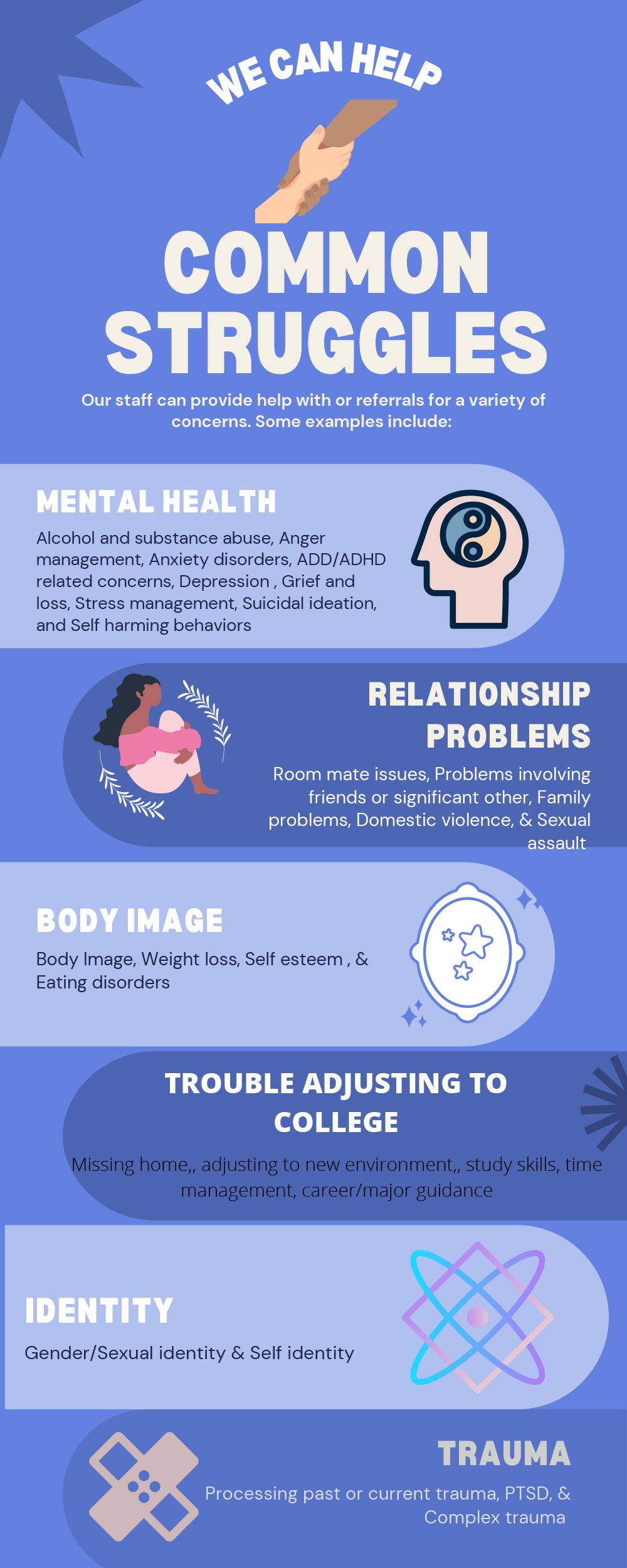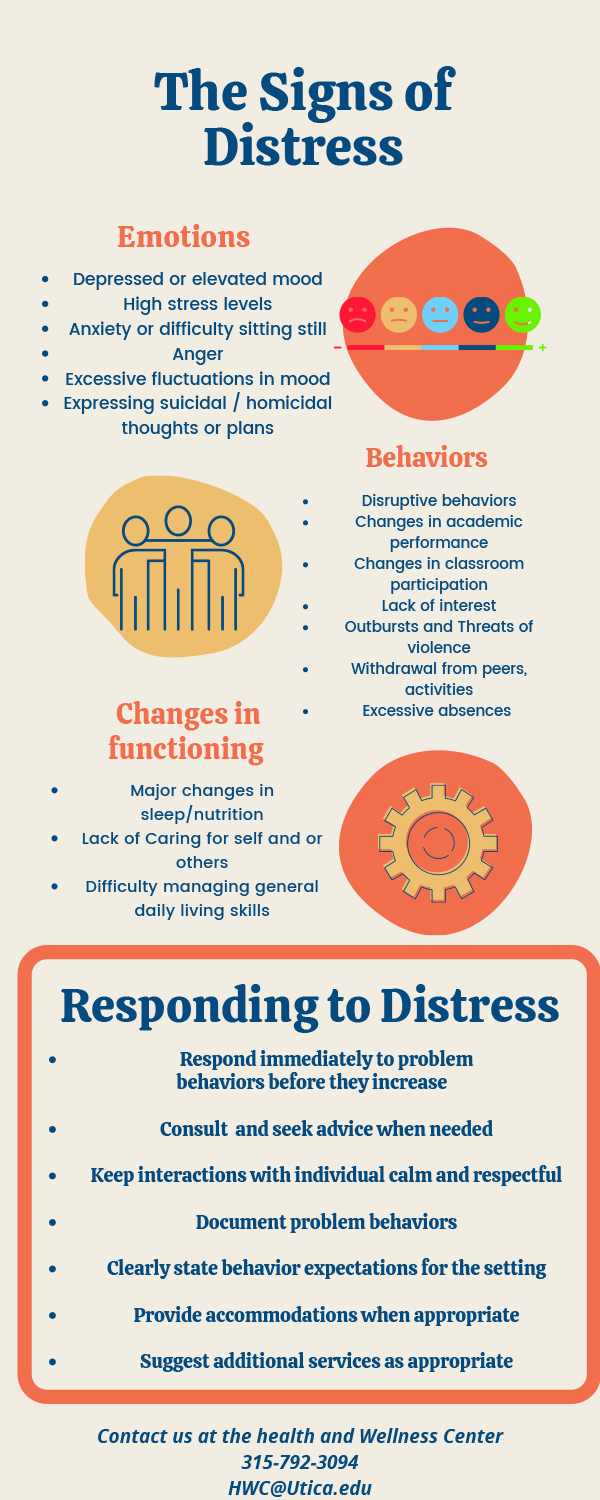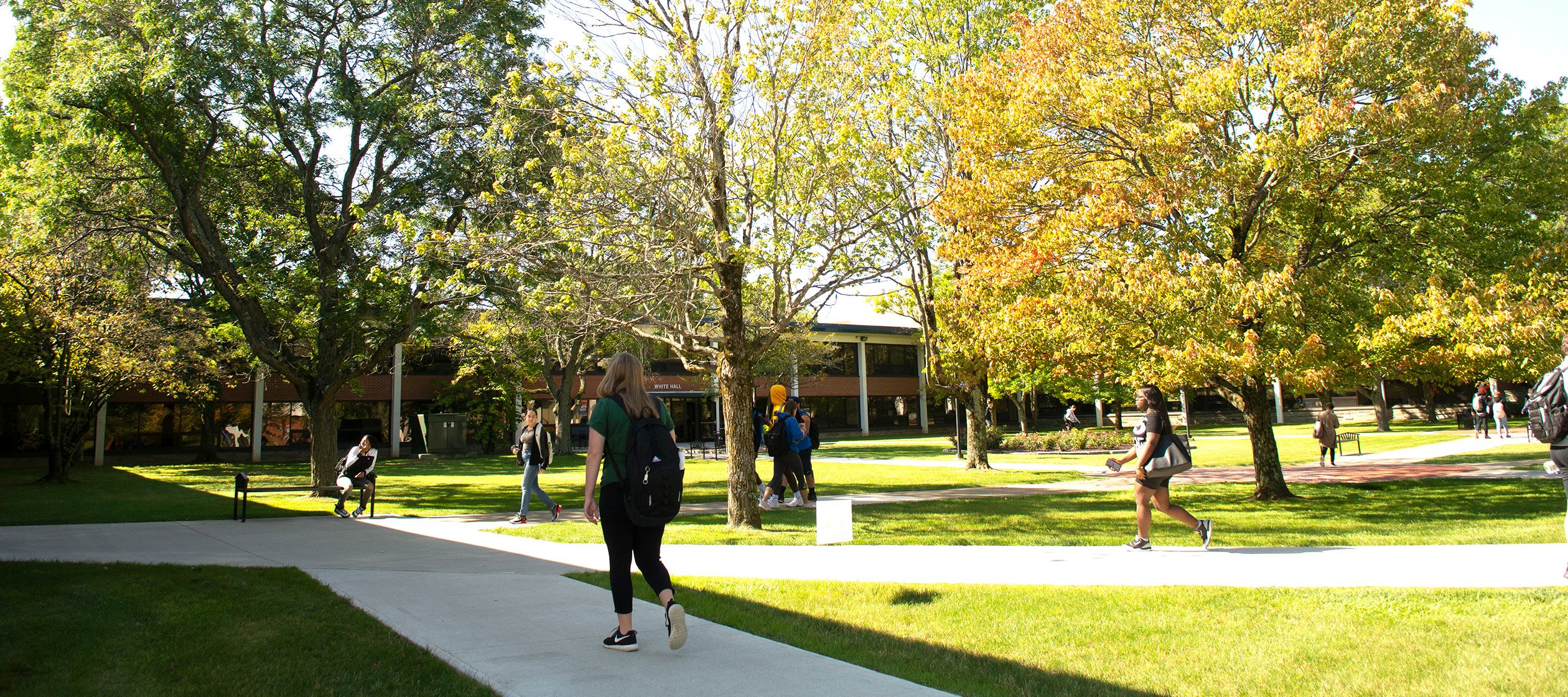
Student Counseling Services
Utica University Counseling Center
Room 204, Strebel Student Center | (315) 792-3094 | hwc@utica.edu
Life is tough, but so are you. Here in the Counseling Center, we understand that. University is a special time in one's life and as exciting as it may be, it can be stressful and challenging. We can be faced with unforeseen circumstances and/ or disappointments that create significant barriers and impact our mental health. We are here to support and provide you with the support you need to handle difficult times and improve your overall well being.
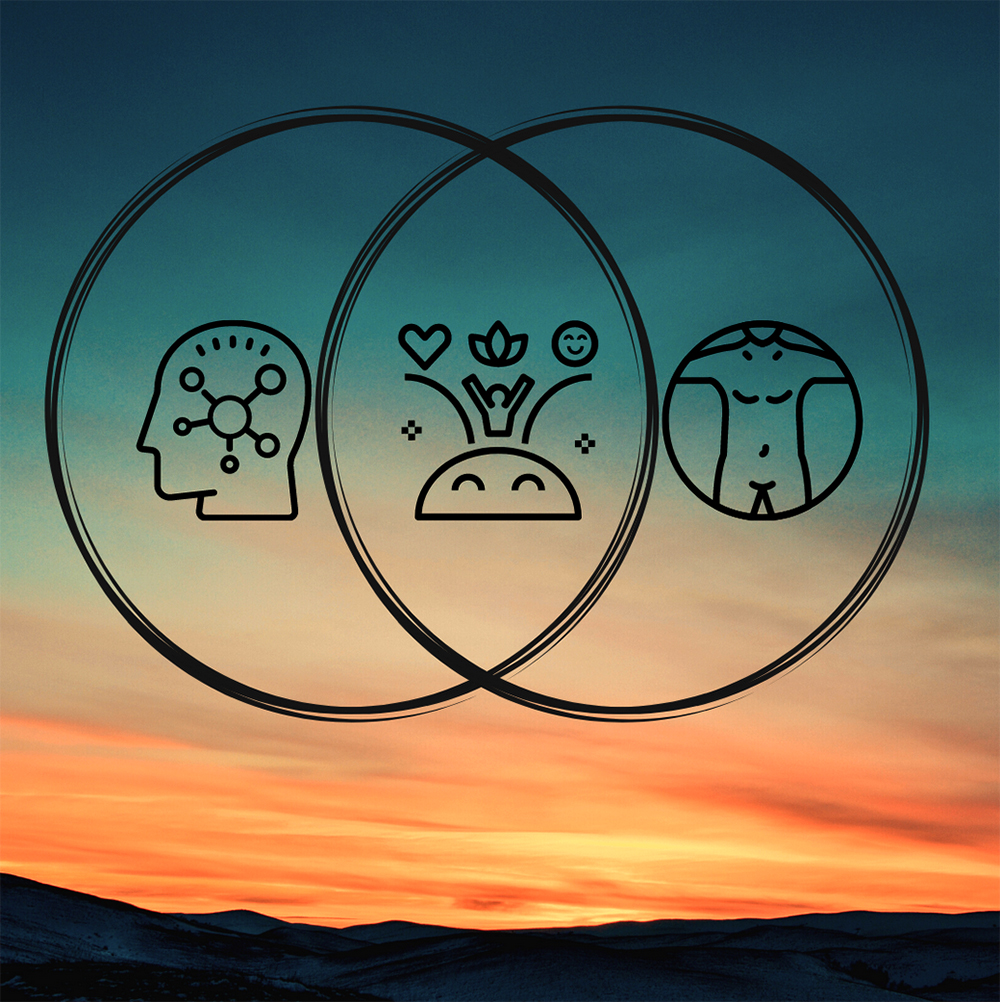
College is meant to be fun! Let us help you make the best of your experience!
Services
Services are confidential and free of charge
How to make an appointment
- Email us at hwc@utica.edu
- Book online with Kristie Bailey
- Book online with SofiaRose Gardinier (graduate student intern)
- Call our center directly at (315) 792-3094 or fax us at (315) 792-3700
- Stop by our office - Room 204, Strebel Student Center - and make an appointment in person
- If it is after hours please call our Uwill Crisis Line at 833-646-1526 or Campus Safety at 315-792-3046.
- In person and telehealth sessions are provided. Telehealth can be provided on a case to case basis when seen as appropriate and within New York state.

HOURS:
Monday - Friday
8:30 a.m. - 5:00 p.m.
Please Note: While email is private, it is not confidential.
How to refer a friend or student
To make a referral to the Counseling Center, please fill out this form completely (click on the icon below). Someone will be in touch with the student within 2 business days. If you do not think it can wait 2 business days, please contact our office immediately.
What to do if you or a friend is in crisis
Mental health crises that occur on campus are handled by the Counseling Staff. For crises that occur during office hours, the Counseling Staff can be reached either by:
- calling the office at (315) 792-3094 Monday through friday 8:30 AM-5:00PM
- contacting Campus Safety (315) 792-3046 and MCAT will be contacted by campus safety or contact MCAT directly at 315-732-6228
- If a student is not currently registered for classes, we are not able to meet with them, however we can provide local counseling/emergency resources.

Mobile Crisis Assessment Team:
(315) 732-6228
Crisis Text Line:
Text HOME to 741 741
Uwill Free Virtual Counseling When You Want It
Utica University has partnered with Uwill to provide free access to teletherapy. It’s a convenient and secure connection to a licensed mental health counselor with appointment options during the day, at night, and on weekends. With Uwill, you can:
- Choose your therapist based on your preferences
- Schedule the time that works best for you
- Select appointment types from video, phone, chat, or messaging
Uwill’s therapist can assist students with their specific concerns, including:
- Anxiety
- Depression
- Family concerns
- Loneliness
- Sleep disturbance
- Stress
Additional Information
Counseling is:
- An outlet to explore feelings, examine beliefs, and work toward making healthy changes.
- A way to gain new perspectives on behavior, emotions, and relationships.
- Developing skills to effectively cope with challenges, uncertainties, and conflict.
Services we offer to students include:
- Individual therapy
- Individual and group psychoeducation
- Substance abuse assessments
- Case management
- Outpatient referrals
- Crisis intervention
- Campus wide events and programs
Confidentiality
Confidentiality is of the utmost importance in the counseling relationship and student concerns are not shared except in circumstances where there is a threat to self or others. In the case of threat to self or others, notification is at the discretion of the counselor in consultation with the Director of Counseling and/or other appropriate Utica College personnel when needed. Without your permission, we will not and cannot update or inform your parents, family and/or friends on your involvement with our services.
Our staff is composed of professionally trained clinicians, licensed by the State of New York, who can assist you with a wide variety of concerns. It is our belief that the university experience is all about learning and growing, both professionally and personally. We are here to assist you in overcoming challenges and gain personal insights as well as skills beneficial to improve your overall well-being . Additionally, we are here to support faculty/staff learn ways to more effectively support, communicate and/or work with difficult or struggling students.
Click on the names of our clinicians below to learn more about them.
Ariel Rios, LCSW
Executive Director of Health & Wellness Center (HWC)
alrios1@utica.edu
(315) 792-3508
Kristie Bailey, LMFT
Senior Clinical Counselor
klbailey@utica.edu
(315) 792-3093
Links for additional support resources:
Mobile Crisis Assessment Team
(MCAT)(315) 732-6228
www.neighborhoodctr.org/services/mobile-crisis-assessment-team/
Crisis Text Line
Text HOME to 741 741
Veterans Crisis Line
1-800-273-8255, press 1
www.veteranscrisisline.net/
National Suicide Prevention Lifelife
1-988-273-8255
www.suicidepreventionlifeline.org/
warmline.org/warmdir.html#new-york
www.naminys.org/mental-health-support/getting-support/
Trevor Project
1-866-488-7386
www.thetrevorproject.org/
YWCA Domestic and Sexual Violence Hotline Oneida County
315-797-7740
www.ywcamv.org/

Links for mental health information:
The Top Mental Health Challenges Facing Students:
This guide helps to identify the signs and symptoms of common mental health issues for college students and where and when to seek help.
www.bestcolleges.com/resources/top-5-mental-health-problems-facing-college-students/
New York Project Hope
For support, psychoeducation, finding a provider, and exploring coping skills
nyprojecthope.org/
Active Minds:
Changing the conversation on mental health in the college community. If you are interested in becoming a member, please contact us!
www.activeminds.org
Half of Us
Stories and Information regarding Mental Health and Mental Illness
www.halfofus.com/
National Institute of Mental Health
www.nimh.nih.gov
Helpguide.org
An online resource to help you improve your mental and emotional health. Includes information on relationships, addiction, eating disorders, stress, grief and loss, and many other topics.
www.helpguide.org/home-pages/emotional-health.htm
Links for LGBQTIA resources
The Trevor Project
www.thetrevorproject.org/
LGBTQIA Resource Center at University of California Davis
lgbtqia.ucdavis.edu/about
Links for domestic Violence and Sexual assault information:
www.rainn.org/
www.nsvrc.org/
www.ywca.org/
nomore.org/learn/resources/
Links for alcohol and other drug information:
Recovery.org
Seeking Addiction Treatment?
1-888-653-5601
www.recovery.org
abovetheinfluence.com
www.therecoveryvillage.com/resources/college-students/
drunkcalc.com/
Message to staff and faculty regarding services
Our counseling staff is here to assist you in providing support to your students in order to be successful in their studies and all realms of their lives. As staff and faculty, you often are the first to recognize concerns with students and recognize signs of distress. We are a resource for you to contact when you have any questions or concerns regarding the mental well-being of a student. Together, we can make a difference in the lives of the students we serve. Our staff is composed of multiple N.Y. licensed mental health professionals with a wide range of expertise in treatment to address various issues impeding on one's mental health. Services we offer include:
- Individual counseling services (In-person and telehealth within New York state. We will not meet with students connected to outpatient treatment providers as it is a duplication of services.)
- Individual and group psychoeducation
- Crisis intervention
- Case management
- Outreach
- Campus wide events and programming
Please feel free to contact us with any questions or schedule a counselor to attend your class!
P# 315-792-3094
Email: HWC@utica.edu
How to make a referral
To make a referral to the Counseling Center, please fill out this form completely (click on the icon below). Someone will be in touch with the student within 2 business days. If you do not think it can wait 2 business days, please contact our office immediately.
What you can do
Mental health crises on campus are addressed by counseling staff. If there are safety concerns for a student or the safety of others in your presence , please remain with the student.
During office hours, call the office for immediate assistance at (315) 792-3094 Monday through Friday 8:30 AM-5:00PM.
After hours or on the weekends, contact Campus Safety (315) 792-3046 and they will assist in linkage to crisis services.
Other Resources:
Mobile Crisis Assessment Team: (315) 732-6228
National Suicide Hotline: 1-800-273-8255
Crisis text line: text HOME to 741 741
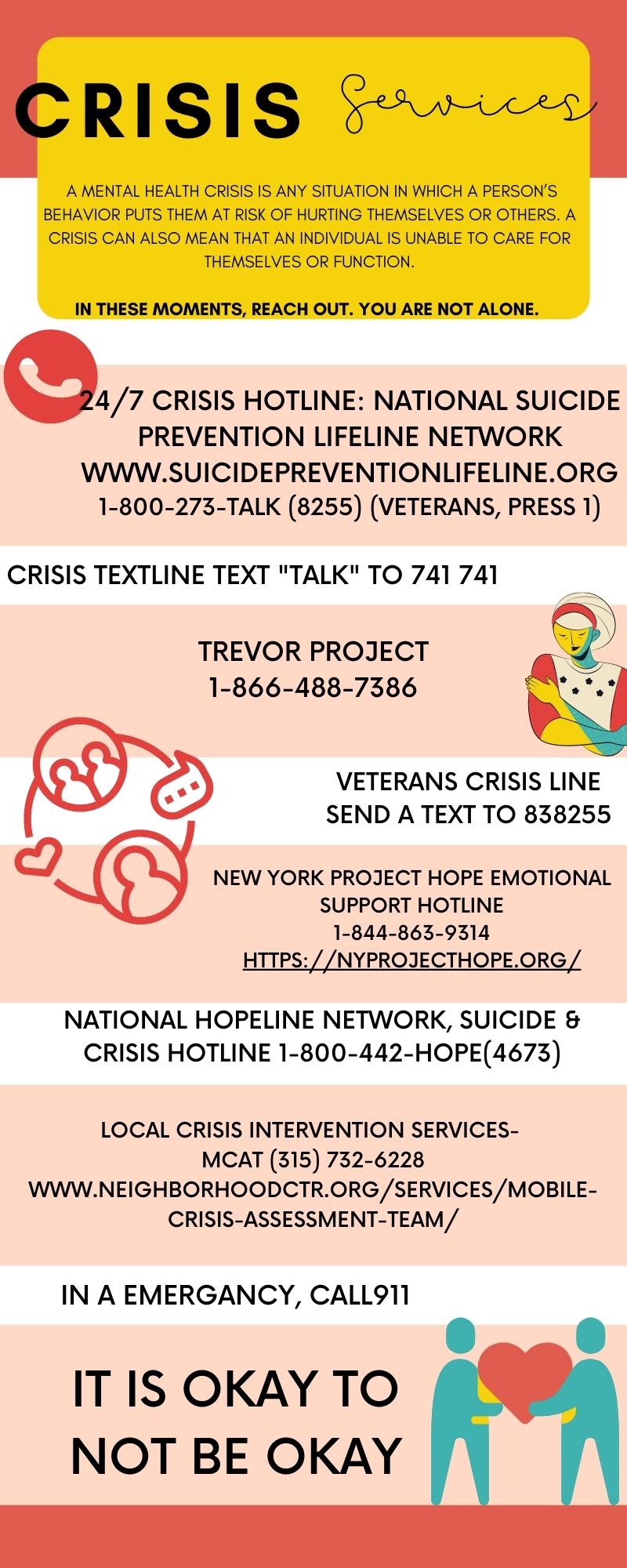
More Resources
I would like to see logins and resources for:
For a general list of frequently used logins, you can also visit our logins page.


